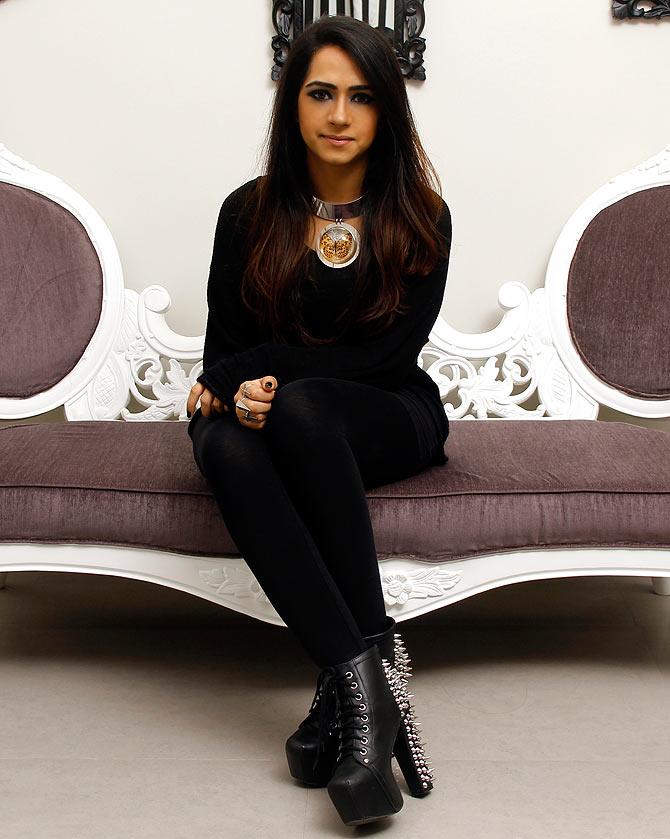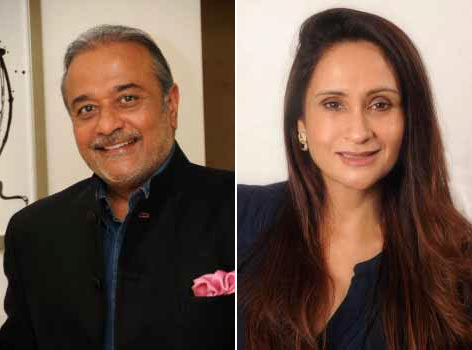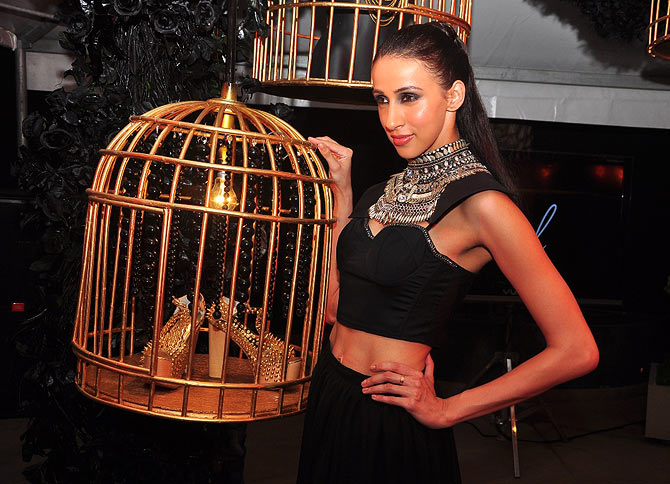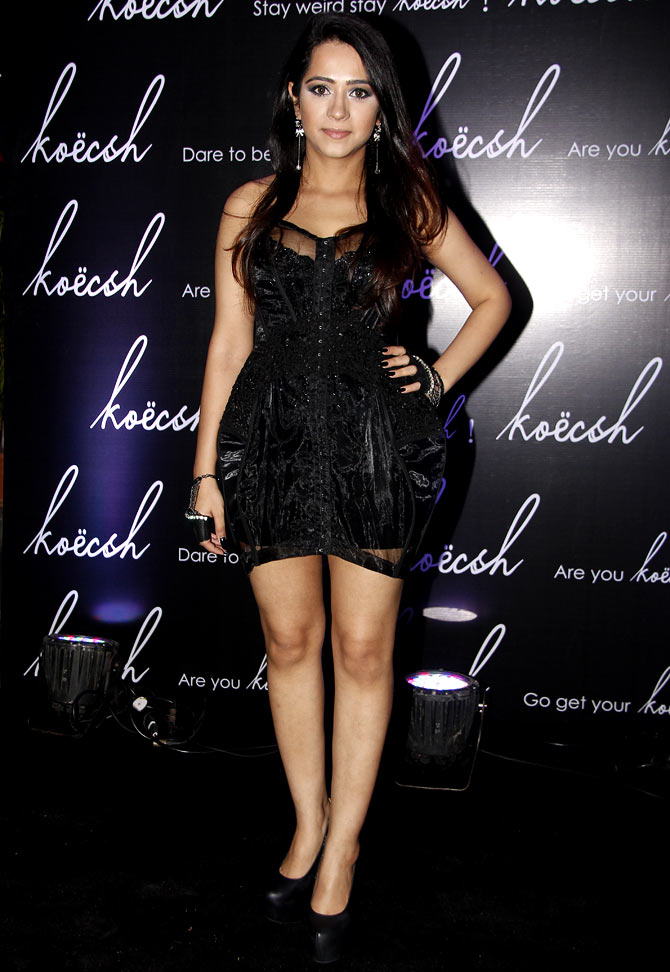
Fashion designer Kresha Bajaj speaks about her tryst with fashion, brand Koecsh, the challenges she faced, and lessons she learnt as a young entrepreneur.
Koecsh is just Kresha Bajaj," says fashion designer Kresha Bajaj emphasising the effort she has taken to surmount challenges and bring her dream to fruition. While she also takes pride in saying she seeks advice and guidance from her illustrious parents -- her father Kishor Bajaj and mother Kintu Bajaj are into hospitality and high-end fashion -- Kresha always knew that she wanted to be on her own when she grew up.
Like many children who are born with a silver spoon, Kresha too could have joined her father's fashion-to-hospitality empire. Her father Kishor Bajaj who began his entrepreneurial journey in 1976 with a single sewing machine worked hard to build the Bada Saab Group that is now into corporate attiring, bespoke tailoring, premium retailing and now luxury hospitality.
But then Kresha opted to chart her own path. Her parents helped her by letting her study fashion designing for seven years in top schools in London, New York, Paris and Los Angeles.
"I didn't want to be a kid of some dad who was just trying to make it," she says.
Founder of recently-launched online portal Koecsh that retails global brands and homemade designs at affordable prices, Kresha speaks about her work, the challenges she faced and the lessons she learnt as a young entrepreneur.
How did fashion happen to you? What got you interested in fashion?
Growing up with parents who were very active in the fashion world I was introduced to it at a very early age and I just fell in love with everything around me. From the age of 4 or 5 when I began sketching, I just knew that this was what I wanted to do. To have the vision in my head, put it down on paper and actually see it come to life to me it was just absolutely fascinating. There was nothing else I wanted to do.
What kind of help did you receive from your parents? Or did you decide not to take any help from them?
Of course I have a stamp of my parents because everything I have learnt and gained is from their illustrious career and experience. My dad always taught me to not be dependent on anyone ever. He didn’t even go to college. He is a tenth standard dropout. He encouraged me to learn. He used to tell me that 'you should be able to sit in the karigar’s (tailors) position if he is not there and sow the entire thing'. That is what I got from him.
And of course he allowed me to study for seven years. That was such a huge support. A lot of my friends got to study abroad for a couple of years and had to come back and take over their businesses. But my parents supported my dream.
As far as Koecsh is concerned I wanted to do it 100 per cent by myself. I didn’t want to be a kid of some dad who was just trying to make it. I really wanted to be on my own from ground up. They have not been involved in Koecsh at all. In fact, when they came for my launch, they were like this is cool, this is fun but as far as decisions are concerned I do it all by myself. Of course, I go to them for their advice whenever needed; I count on them for their experience and knowledge.
But Koecsh is just Kresha Bajaj!
How did you hone your skills? Tell us about the transformation that happened...
I started sketching at a very young age and instead of going to the garden and playing with my friends I would sit in my father’s fashion shop with the designers and learn how to sketch. I just kept practicing. Right after I graduated from high school, I did my IB (International Baccalaureate), I went straight into a fashion school and I studied design and marketing and tried to excel at the sketching and technical part of it. For seven years I learnt every single aspect of fashion: the marketing, the business, pattern cutting, patterning, sowing, threading every single thing.
I wanted to understand every single stage of fashion designing. I did not want anyone telling me that this is not possible or you cannot make a pattern like this so you cannot do it.
I never wanted to be dependent on anyone. So, I just studied fashion from head to toe.
Which fashion school did you graduate from?
I did two main courses in two universities.
I started with London College of Fashion where I studied four years and then I did short courses in Parsons New York and Parsons Paris as summer intensives and then last three years I was in FIDM Los Angeles, which is the Fashion Institute of Design and Merchandising.

Tell us about your experiences of studying in these colleges...
The great thing was every single city and every single university has its own forte.
London was all about being creative, thinking out of the box. They never told us what we can or cannot do; they just encouraged us to do things as crazy as we wanted to. That really helped evolve my imagination and use unconventional materials and fabrics to make conventional things.
Parsons New York was very technical; it was probably my toughest experience where we have to do like 100 sketches a night and every single thing has to be in place. So, I initially started with being very creative and then learnt to bring my creativity to a point where it still remained technical.
Parsons Paris was very illustrated. It taught us how to use our imagination and create things. So, it was the best of both worlds and then my last three years in Los Angeles was back to basics, which I had never really learnt in London because they just left us with no leash.
Los Angeles was a very grounding experience because though we were allowed to be creative, we had to be technical. We had to do the basics first for we were given that liberty to go off the beaten path and do what we wanted.
When did you come back to India and what inspired you to start Koecsh?
I came back to Mumbai last December and I wanted to start Koecsh because there was a huge gap in the market for a brand that was edgy, very different, a little bit daring but still have affordable prices. Now, we have a lot of amazing Indian designers who do really edgy stuff but their price tags are very exuberant and then we have really cool high street where you can go and get really cheap clothes. But those are like three-wash clothing as we call them. Three washes and you are done.
So, there was a huge gap between the need for a high fashion brand with high street prices. So, I decided to create Koecsh, a weird, cool, very daring stuff that you don’t usually see in India, stuff that you see on red carpet and these crazy pop stars like Lady Gaga and Nicki Minaj and you always think that’s so cool. But you can’t wear the entire look, head to toe.
So Koecsh has elements of things that are different; that are unique and very fashion forward.
This is available online as we are not restricted to the brick and mortar store and being online we have such a wide reach throughout India and the day we went online we were delivering to 233 countries.
What did you learn from your parents? How is it helping you to carve your own path?
The biggest thing my dad taught me was the value of hard work and how not to give up. That is something that has helped me a lot. Initially, when I wanted to do something like Koecsh, a lot of people told me that the way I dress, the way my fashion is it is all too weird. People in India are not going to accept it.
Then there were people who told me that with these kinds of prices you are not going to get good quality. They told me that 'you are still living in your international bubble; come back to India'.
But my dad always encouraged me to believe in what I thought would work for me. He would often tell me, 'you are only as good as your next idea'. He taught me to fight for my convictions and believe in my gut instincts.
With my mom it was always patience. She is very grounded. She is the opposite of my dad. Dad is a little more out there and she is a little softer. I am more like my dad, because I get really frustrated at times. I learnt the virtue of patience from my mother.

What were your biggest challenges when you started?
I would say there were two biggest challenges. One was production. We are a small company right now that cannot reach economies of scale. We also wanted to keep our products within certain price ranges. So, initially we looked at outsourcing our products from reputable vendors who would do it for us but the quality of what we got for those prices were absolutely unacceptable to us.
Being my dad’s daughter -- and he is a stickler for quality, for him every stitch has to be in place -- I have also grown up with that kind of eye and it was a huge struggle to get a particular product for a given price without compromising on quality.
That was the biggest battle we faced because we wanted to give our customers the best of both worlds and getting that balance between high-quality at affordable price was the biggest challenge.
The other challenge was that of logistics.
From the day we went live I wanted Koecsh to be open to the world. I didn't want anyone from any country come to Koecsh and feel disappointed if we didn't deliver it where they wanted. This would have discouraged them from coming to our site again and recommend it to their friends. I wanted to deliver our products to every possible country in the world. The whole process of making us capable of delivering to 233 countries literally from the day we went live was another serious challenge we surmounted through sheer determination.
Also, we wanted our return and exchange policy to be really customer-friendly.
We wanted it to be a really easy experience for the customer. We wanted to get our deliveries at the doorsteps of our customers in 5 to 7 days in India instead of two weeks -- we try to deliver internationally too in 5 to 7 days but we have put that at 10 days just in case. If you want to buy something then you want it yesterday. You don’t want to wait till the next day. We wanted to give that experience to the customer.
Describe brand Koecsh, its personality, and its style... Has it been accepted by Indians?
Koecsh is a portal for all things cool, fun, weird, crazy, edgy. It’s a platform where I want people to come and find really unique and fashion-forward products which is not limited to a certain kind of person. Apart from edgy fashion you will also find very pretty, floral dresses, classic shirts and you will find products ranging from Rs 400 to Rs 42,000.
This portal does not restrict any age, any income group or any kind of style or preference a person has.
The other thing why it is different is because it is not product-driven. Koecsh is brand-driven.
So, we have products from Dior and YSL, Jefferey Campbell and all these brands and then we have high street, the more affordable products but when you actually go to the portal it doesn’t tell you about the price or brand of a product. That you will come to know only when you click on it.
This is a very different concept and we are trying to encourage ‘wear what you want’. It doesn’t matter what people say about your style and fashion.
In terms of acceptance it is good to know that people are realising that there isn’t anything like Koecsh in the market. We plan to sell not only clothes designed by me but we are also looking at other designers coming on board. Designers who don’t have the means to create their own store or brand.
I want Koecsh to be a portal that will encourage designers. I have a lot of friends who were not given that kind of a free hand because they were so young, no one took them seriously. Hey have so much talent but nobody’s giving them their due.
I want Koecsh to be India’s platform for talented designers. Koecsh is open to sell any designers provided those clothes are exclusively designed for us.

Lessons learnt as a young entrepreneur
The main lesson learnt relates to communication with vendors and your customers. I think you just have to learn how to communicate with different people.
Since I am a little soft spoken I don’t get taken very seriously. Initially, I would run around people and nothing would come out of it. But now I have learnt to negotiate with them.
In a way I learn more from my staff. I have a group of really cool people and the concept of what we have created is a little different. This place (where Koecsh’s office is) is like a house. The whole idea was of us being a home, a family and not like a workplace or a boutique shop.
Because of this work environment we have a very free communication among ourselves. I have been able to learn a lot about my staff’s work processes, how they work and how they contribute.
Koecsh has taught me the value of team spirit.
Indian stars you would like to dress up...
Kangna Ranaut, because she is very experimental and I love that about her. Every single time you see her she looks completely different. She knows something about reinvention, she keeps inventing her looks. She is not afraid to dress up and I love people like that.
Indian politician you would like to dress up?
I think Rahul Gandhi. I think he looks cool in white kurtas and salwars.
Would you not want to dress him up in the Koecsh style?
I believe you should not make someone be you. If his thing is white-on-white then I would come up with a really cool and unique design that would compliment his personal style and would make him feel comfortable. More than dressing for someone else the person should feel comfortable in what s/he wears.
Your advice to young fashion designers who would want to start on their own…
People should go with their gut instinct. In India people are still in that phase where they tell you what you can or cannot do because we have certain norms of dressing.
There are norms of what is right and what is wrong. It is not the end of the world for someone to try and break out of that shell. It is okay if you don't want to stick to traditional stuff that everyone expects you to do.
If someone has a really creative idea along with a solid business concept then it is definitely going to work.
How do you handle success and failure? Define them...
To me success is when you are happy, when your work is going to a new level.
Failure is just a really tough question that you have to figure out the answer for yourself, to succeed. Failure is part of the game once you start on your own. But unless you die you still have a chance to convert your failures into success.
Sometimes you take just a minute to figure it out; sometimes you take months. Sometimes failures are like twisted questions where they probably take you in circles over-and-over again and you have to try all three multiple choice answers unless you find the correct one.
Failure is a learning experience and of course with emotions, being human you feel down and sad but it is very important to pick yourself up again and go for it. Otherwise you are no getting anywhere.
Success is just a state of happiness. If you aren't happy, then you aren't really successful.
Both success and failure are an ongoing process.
What's your dressing style?
I just go with my mood. From a young age I have been very experimental. I have tried really crazy things to completely spiked-out girlie jackets to very girlie, princess dresses. Whatever I am feeling in the day I go along with it.